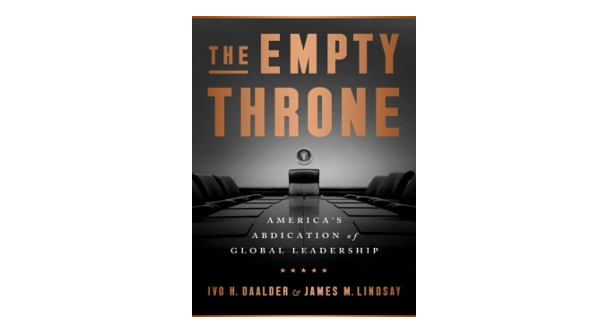
Image credit: Public Affairs Books

Image credit: Public Affairs Books
I'm only a few pages in, and The Empty Throne has already impressed, with
the best description of Trumpism I've read yet. Framed against the rules based
new world order the US championed after World War II, and how it is failing to
maintain in the context of the 21st century globalization:
The rapid growth in the movement of goods, money, people, and ideas across borders --
globalization, as it came to be called — produced more problems and at a faster rate
than national governments could handle. International institutions seemed stuck in
the Cold War, unable to grapple with these new transnational challenges.... American
leadership ... hoped to get "responsible stakeholders" [as allies] who would gradually take on
more responsibilities while still deferring to Washington's lead. They instead got
countries that often preferred free riding on Washington's efforts or championing
their own ideas for improvements to the rules-based order.... Donald Trump recognized
many of the problems bedeviling America's role in the world.... But unlike all of his
predecessors since Truman, he didn't see global leadership as the solution to what
ailed America. To the contrary. He saw it as the problem. America's alliance committments
had, in his view, required the United States to "pay billions — hundreds of billions
of dollars to supporting other countries that are in theory wealthier than we are."
America's trade policies had "de-industrialized America, uprooting our industry,
and stripped bare towns like Detroit and Baltimore." ...
What Trump was offering was a return to a foreign policy based the logic of competition and domination.... Trump's
first year and a half in office sent an unmistakeable message. He had no interest in
leading America's friends and allies. He was looking to beat them. His was not a win-win
world, but a world of winners and losers.... Trump was comfortable abdicating
American leadership because he saw no value in it — just costs.
I've distilled for you what I found to be the most level and unbiased description
of the president's foreign policy I've seen.
My Comment
I find this important and amazing insight, because the president's approach to
government seems nearly perfectly reflected in how he operates with politicians over
Twitter. He has nothing... presidential... to say to anyone who isn't aboard the Trump
Train. All he has for them are insults and threats: techniques of domination.
The book quoted him from, presumably, The Art of the Deal (emphasis mine): "You hear lots
of people say that a great deal is when both sides win," [Trump] once wrote. "That is
a bunch of crap. In a great deal you win — not the other side. You crush the opponent
and come away with something better for yourself."
On Twitter, almost nightly, Trump caws at any he perceives as an opponent.

"Crooked Hillary" Clinton. "Leakin' James Comey". "Lyin' Ted" Cruz (a fellow Republican, but
a political opponent early in the 2012 race). The list goes on. This isn't about competition.
Competition does not include ad hominem attacks.
It's about domination. Everything he does is about domination.
Why was he so proud to shut down the government for a month? Domination. Why are we headed
for another shutdown? Domination. He is incapable of compromise; win-win is anathema. He's
wired only for the great deal, and for crushing the opposition.
|